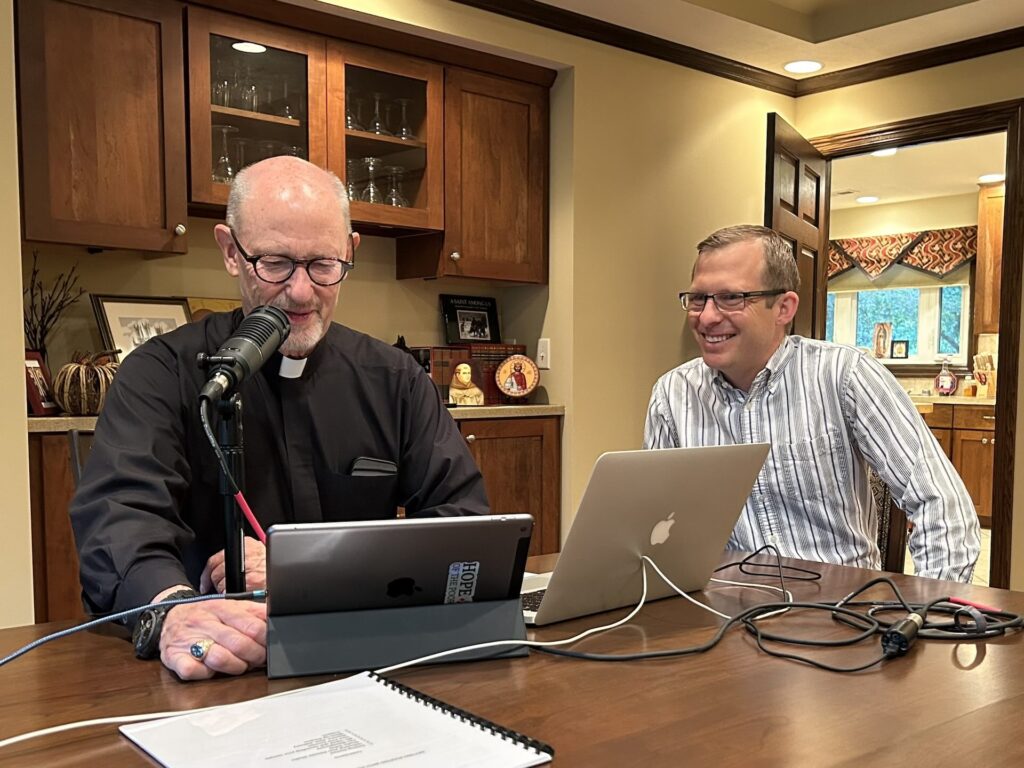A Reading from the Book of Genesis
These are the generations of the heavens and the earth when they were created. In the day that the Lord God made the earth and the heavens, when no plant of the field was yet in the earth and no herb of the field had yet sprung up—for the Lord God had not caused it to rain upon the earth, and there was no man to till the ground; but a mist went up from the earth and watered the whole face of the ground—then the Lord God formed man of dust from the ground, and breathed into his nostrils the breath of life; and man became a living soul. And the Lord God planted a garden in Eden, in the east; and there he put the man whom he had formed. And out of the ground the Lord God made to grow every tree that is pleasant to the sight and good for food, the tree of life also in the midst of the garden, and the tree of the knowledge of good and evil.
A river flowed out of Eden to water the garden, and there it divided and became four rivers. The name of the first is Pishon; it is the one which flows around the whole land of Havilah, where there is gold; and the gold of that land is good; bdellium and onyx stone are there. The name of the second river is Gihon; it is the one which flows around the whole land of Cush. And the name of the third river is Tigris, which flows east of Assyria. And the fourth river is the Euphrates.
The Lord God took the man and put him in the garden of Eden to till it and keep it. And the Lord God commanded the man, saying, “You may freely eat of every tree of the garden; but of the tree of the knowledge of good and evil you shall not eat, for in the day that you eat of it you shall die.” Then the Lord God said, “It is not good that the man should be alone; I will make him a helper fit for him.” So out of the ground the Lord God formed every beast of the field and every bird of the air, and brought them to the man to see what he would call them; and whatever the man called every living creature, that was its name. The man gave names to all cattle, and to the birds of the air, and to every beast of the field; but for the man there was not found a helper fit for him. So the Lord God caused a deep sleep to fall upon the man, and while he slept took one of his ribs and closed up its place with flesh; and the rib which the Lord God had taken from the man he made into a woman and brought her to the man. Then the man said, “This at last is bone of my bones and flesh of my flesh; she shall be called Woman, because she was taken out of Man.” Therefore a man leaves his father and his mother and clings to his wife, and they become one flesh.
Reflection
In his monumental work on the Theology of the Body, Pope St. John Paul II introduced some key terms: “original solitude,” “original unity,” and “original nakedness.”
Original solitude described the state of man in the beginning when he was alone with God.
In that state, the man had self-awareness, a sense of purpose, and a capacity for self-determination.
He could experience himself as a person from the inside.
He could carry out God’s task to name the animals.
He could also follow God’s command not to eat of the tree of the knowledge of good and evil.
Furthermore, as he named the animals he could also see that none of them were like him.
They did not have the “original solitude” that he had.
When he looked into their eyes, he could not see a heart with its own personal story.
He only saw a blank stare.
There was nothing in them that could say “I.”
In this original solitude, Adam was in the image and likeness of God and he had a personal relationship with God.
He was in a state of grace.
He was without sin.
Isn’t this the goal of the spiritual life?
This is often what we are striving for.
On our own, we try harder, try to follow all the rules, try to carry out the tasks and try to overcome sin.
As Christians, we might dutifully note that we could not do it without God’s grace.
We could not achieve this state of perfection without Christ.
Sometimes that is a deeply felt truth, having come to know our own weakness, and having found true strength in Him.
But sometimes it is merely lip service, knowing that we should mention the Name of God and give Him some credit in our successes.
Honestly, though, we don’t really know how He was involved in our successes.
Most surprisingly, God declares that even all this perfection in behavior is not the ultimate goal: “It is not good for man to be alone.”
As the creation narrative unfolds, we discover that we are made in an original unity and for a communion of persons: “I will make a helper fit for him.”
Pope St. John Paul II teaches that although man is in the image and likeness of God in original solitude, he is MORE in the image and likeness of God when he is in a communion of persons (See his explanation here).
Sometimes we have the notion that relationships are merely a means to an end, as if other people are only there to help me be perfect, because the real goal is for me to go and be perfect on my own.
Genesis teaches us that, to the contrary, solitude with communion is imperfect—it is not good for man to be alone.
Developing a communion of persons with other human beings is an essential part of our destination.
In fact, heaven is a total communion of persons.
In this light, we can see the importance, but also the relative value of our personal spiritual exercises.
We can also see the ultimate importance of our relationships.
Our anchor, our group, our family, our friends, are not added extras.
They make up the communion of persons which is already becoming a foretaste of heaven.




